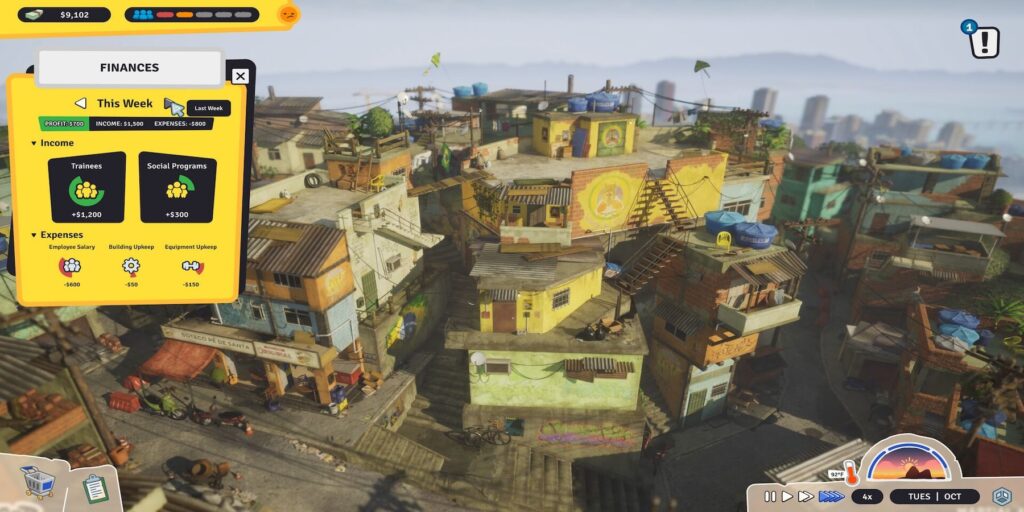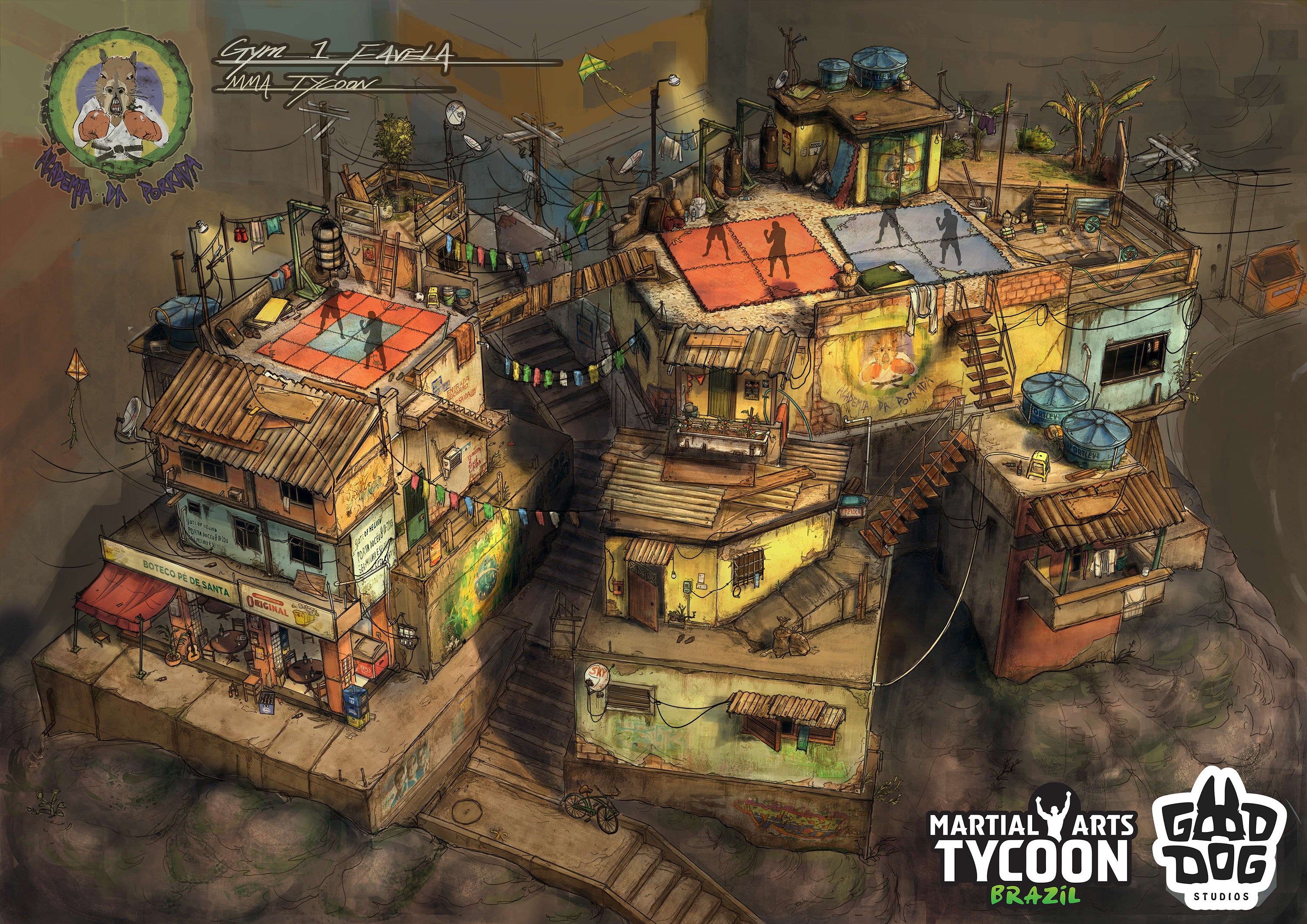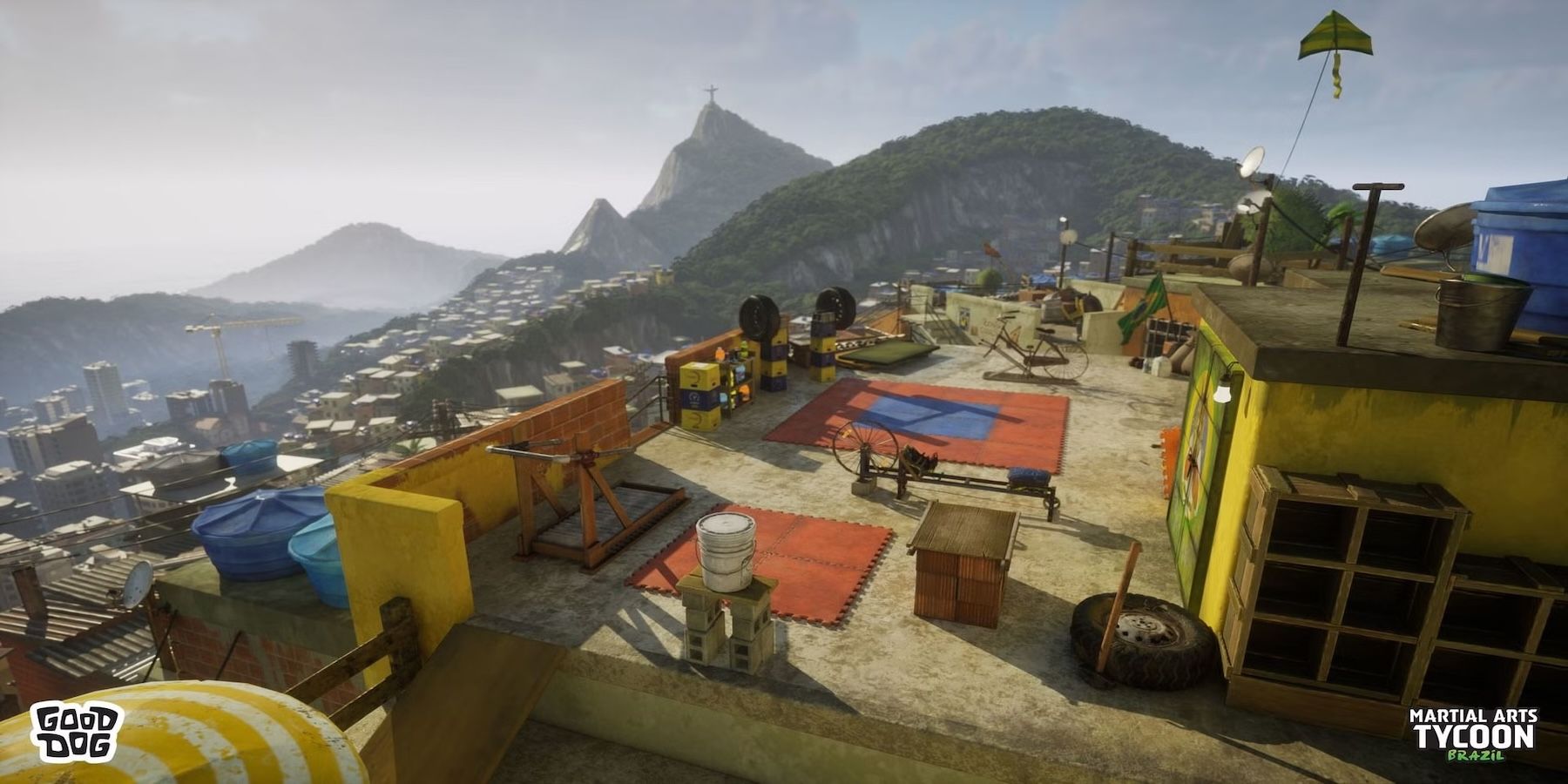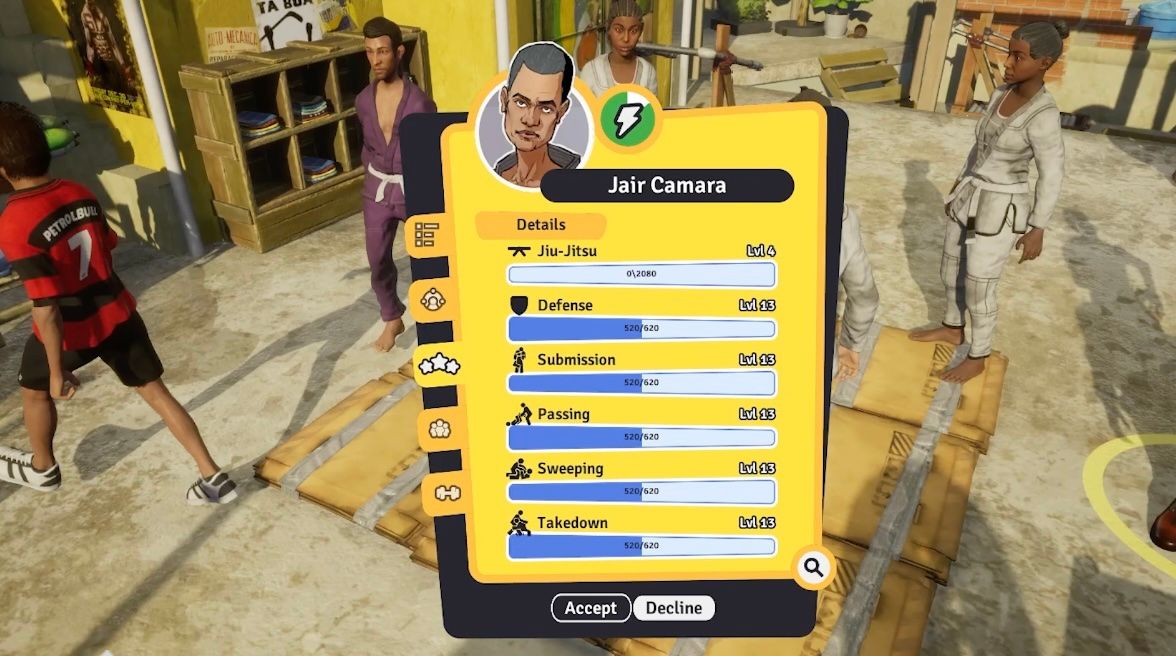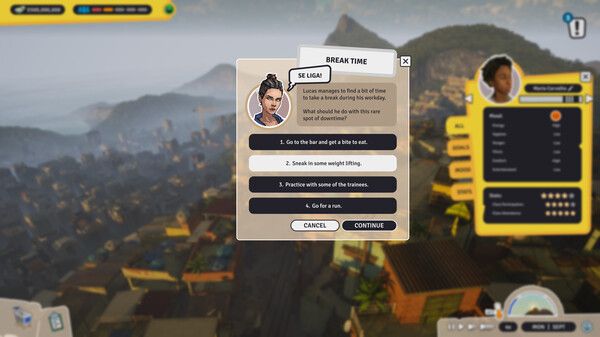If any mixed martial arts fans have wished for a tycoon game, they’re in luck. Good Dog Studios CEO and creative director Chance Glasco noticed the lack of a tycoon martial arts game (one focused on a gym, not just a fighter) following his experiences in Brazil and overall love for jiu-jitsu. In a world with pressure washer, lawnmower, and hospital simulators, Glasco thought it was time to let gamers run their own jiu-jitsu gym.
But Martial Arts Tycoon: Brazil will be more than just that, Glasco explained. Speaking to Game Rant at Gamescom LATAM, the industry veteran detailed the importance of implementing climate change elements in video games, breaking down Brazilian stereotypes, and, ultimately, the goal to “just be a good human” through Martial Arts Tycoon. The following transcript has been edited for clarity and brevity.
From Call of Duty to Martial Arts Tycoon
Q: What was the journey like from Call of Duty to Good Dog?
A: Including working on Medal of Honor: Allied Assault, it was about 13 years of working on first-person shooters. I worked on World War 2 games for longer than America was in World War 2. I just burned out. Even if you changed up the setting, I was like, “I want to do something different” and I made a lot of trips to Brazil as a guest speaker. I was kind of the developer voice for Infinity Ward. When it came to the end of the project, they’d send me out to do interviews with various media people in Europe and in Brazil, so I already had some friends here.
I knew I wanted to live in another country. I just basically got the hell out of the country and disappeared for a bit. When I finally quit, I quit after the whole Respawn splitting drama and Activision getting sued. I was like, “I’m done. This is just too much. I’m just going to go to Rio, hopefully the relationship thing works out, train in some jiu-jitsu, relax, go to the beach, and recover from AAA games.” I did a little bit of consulting, and we started a VR start-up for a bit.
We went back to Orlando. We started the VR company right when VR was about to bust, but we also closed the company a few months before COVID. We kind of started the company at the wrong time and we ended the company at the wrong time because VR conferences would have probably gotten a lot more investment as soon as COVID started out. Anyway, I was consulting for games and ended up co-founding the company with one of my clients I had. As game developers, we often have some game ideas in our back pocket while we’re working on other games, like games you want to make.
I thought maybe it was time to make a martial arts tycoon game because there was a lawnmower simulator. How many people are like, “Oh man, if someone would just make a lawn mower simulating game or pressure washing simulator.” Or even hospitals, how many fans of hospitals are there? But you can make a successful hospital-type game.
There’s close to over 600 million people who watch MMA. Why haven’t you seen a game where you manage a martial arts academy? Punch Club was almost that, but you’re managing a fighter. You’re not managing an academy like a bunch of fighters. It just seemed like the right time. For our core team, most of them came from AAA and are other people who are burnt out from it. When you work on something like Call of Duty, you have an artist that’s just making rocks all day or something, and they’re ready to do something fresh, like some variety. With my experience living in Brazil, my love for jiu-jitsu, and the lack of a tycoon martial arts game, I was like, this should happen. That’s more or less how that transition happened.
You just explained it in two or three minutes, but that was years of your life.
A: Yeah, like in Medal of Honor and in Call of Duty, I was 19, and I just turned 20 when I started in the industry.
Martial Arts Tycoon Explained
Q: Can you talk a little bit about the environmental factors for Martial Arts Tycoon as well?
A: Yeah, I’m a senior fellow with the Atlantic Council. They’re a really big think tank out of Washington, D.C. I got connected with them through the president of Full Sail University. I went to Full Sail in Orlando, and I’m working with their climate resilience organization, which is the Adrienne Arscht Foundation Resilience Center. We go by Arscht-Rock for short. Instead of focusing on mitigation of climate where we’re trying to stop global warming and climate change, where we realize we’re already kind of screwed, we focus on things to keep people safe
We’re seeing record-breaking heat every year in the south of Brazil and flooding that affected something like half a million people. We’ve always had climate affecting humans so what can we do through games to actually keep people safer from climate? We work with developers, we do workshops. In the past, we’ve done some grants to basically help get some of these topics in the game. For instance, in Martial Arts TycoonBrazil, we have a daily temperature and that’s based on the average temperature of Rio.
Occasionally you can have a heat wave and depending on the intensity of the heat wave, you have to do things to protect your NPCs. You might have to add some fans, make sure they have water to drink, add something to block the sun, you know, some coverings from the sun to keep their simulated body temperature and something that keeps them happy. Otherwise, they risk injuries which would be heat stroke and exhaustion. If someone has heat exhaustion, maybe they’re out for two weeks and can’t train. If they have heat stroke, maybe they’re out for a couple of weeks and can’t train. Heat stroke can actually affect their attributes and now their agility is lower. The only way you can fix that is through rehab.
We try to make gamers knowledgeable of the risks of heat. In this case, in the future, we’d like to add something like Dengue fever. When it rains and you don’t clean up the puddles, you have a risk of mosquitoes. Those mosquitoes can carry Dengue. If the mosquito bites one of your fighters, they might be out for three months and that’s going to affect your bottom line.
Q: It’s a tycoon game, so making money is important, but it’s interesting there’s this environmental awareness feature.
A: Yeah, I mean, we’re not screaming it at you. It’s just something that we put in there and it fits. It’s also a very culturally grounded game. If you have seen the movie City of God or Elite Squad, most media exposure people outside of Brazil gets makes them have a very horrible idea of Brazilians. They just got a big favela, and in the favela, it’s all drug dealers and police killings. Sure, maybe there’s truth to that, right, but the vast majority of people in these communities are good people just trying to make it. I’m hoping with this game, because you start with very little money, that we’re kind of addressing some of the stereotypes. Favelas are more diverse than most people expect. Not everyone’s a drug dealer, and there are a lot of good people with a very strong sense of community. We’re just kind of trying to address some of those stereotypes through the game. Even in Modern Warfare 2, you’re in a favela, and it’s just full of drug traffickers that you’re killing. I probably didn’t help contributing to that stereotype too much.
Every NPC is procedurally generated. They have a life path, which is like their history. These life paths can basically influence their character traits. For instance, if you have someone that has a life path where they grew up with drug-addicted parents, there’s a higher chance that they’re going to have some kind of drug-related character trait that’s going to affect them negatively. But you’re training jiu-jitsu martial arts, and it helps these characters potentially improve these character traits and hopefully get rid of some of the negative character traits. Or, you might make some bad choices that could actually give them a negative character trait.
An example of this character trait could be a bully. A bully might be strong and athletic, so they have a bonus to athleticism and strength, but maybe they have like a 20% higher chance of injuring another NPC when they train with him. So, you’re like, do I want this guy to join? I want some strong fighters, but he’s going to hurt some of my other characters and now they can’t train for a while because they’re injured.
Q: How would you describe the overall gameplay loop?
A: We start with a more or less empty rooftop. You have some starting money, and you start purchasing some equipment like a thrown-together front desk that is made of beer crates. Some people start walking up to your gym. They’re like, “Hey, I’m interested in training jiu-jitsu,” you’re going to accept them or deny them, they pay a little money upfront, they pay a little each time they show up. As you gain more money, you will be able to upgrade your equipment, you create your own classes. You can drag these blocks of time into like a full hour or hour and a half block and create your own class. You’re scheduling these classes, you’re creating them, you’re showing them from the training, and you’re getting XP in different areas with the risk of being injured and stuff like that too.
You’re trying to manage that risk over time. There might be an opportunity for them to be in a jiu-jitsu tournament or maybe they run into their bully at school. This kid who joined the gym that was getting bullied now, you get to see how that unfolds. Does he beat his bully’s ass? You get to see that play out with a little bit of influence, but for the most part, you’re seeing how all those choices unfold. As these things occur and they go well, you’re building a reputation, which allows you to open more gyms and start earning more money. To summarize, people sign up, you train them, they fight, and they make money throughout all this. You’re investing back in your gym, more or less similar to a lot of tycoon games except there’s a combat phase.
Q: What do you think has been the biggest thing moving to Brazil has added to this game?
A: If I’m going to portray Brazil, I’m going to portray it a lot better if I’ve actually lived here. Even with me, who’s lived in Brazil for over three years in total, I’m still not going to have the whole picture. All of my friends are Brazilian, and in Rio, I have a couple of best friends. One works for the city and the other lives in the same developed community that is depicted in the game, so I get to see different perspectives from different people, different walks of life.
Why Martial Arts Tycoon’s Success is Important
Q: In your panel, you’ll be discussing climate emergencies like heat waves and how that translates in Martial Arts Tycoon, but are there any other games or major areas where you see the relationship between these things?
A: I think, when you’re touching on the favela-related stuff, when you’re talking about more of what happens within those communities, we’re going to show the difficulties that those people face living there. We’re not going to dive into politics, it’s just going to create division and everything, but we want people to understand what are some of the struggles that those communities deal with. In addition, something worth mentioning is that, after working on Call of Duty, making the biggest game ever is not necessarily what makes me tick anymore. Yeah, we’re going to make a great game. It’s fun. It sells a lot of copies. But for me, I want something that’s more impactful.
We did a little test where we raised $3,000 to buy Kimonos for kids and social projects. Last year I went to four social projects and gave out Kimonos to these different projects. I thought we could go much bigger than this. For probably $25,000 or so, we could actually build a jiu-jitsu academy in one of these communities, so one of my biggest goals in this game is for our community to actually make some donations and they can see some kind of impact that they’ve done. We’re not just going to these communities, taking photos, talking to people leaving, and being like, “Look, I’m in a game.” That’s something that really motivates me to make this game successful because, for that to be successful, the game needs to be successful.
Q: When you’re going from something like Call of Duty to trying to make a “game for impact,” how does it change your mindset in development?
A: For me, my mindset, I don’t think I’m making a “game for impact.” I think I’m making a game, and as human beings, we should always try to impact things in positive ways. I wouldn’t label it as that. It’s just that we can’t rely on the government to fix all our problems and this problem requires money, s if you’re in a position in an industry where there’s money involved, you can find some way to give back.
Right now, the whole games for impact thing is a trend, right? There’s like having diversity in your game and there’s having diversity in your game because you actually have diverse friends at a diverse level. Some people have diversity in their game, but they live in a little bubble. They just go out and hunt for that rather than naturally interacting and networking with a diverse set of people, if that makes sense. For me, it’s important to not treat it like some kind of person saving the world, just be a good human, just be a good person.
Q: At this year’s Gamescom, has anything caught your eye this year about this event?
A: For me, the biggest thing this year is that we have a Gamescom. I’ve been living in Brazil for a while now and the problem with gaming events in Brazil – I mean, they’re huge, they attract so many people – but journalists came to BIG Festival from Latin America and none of that media gets outside of South America. Having the Gamescom LATAM label gives it the international attention that the Brazilian market deserves.
80% of Brazilians play games across all genders in the population, right? Brazil is Number 5 in games consumption on the planet, something like that, right? It’s interesting for this market to have international exposure. And there’s so much talent in game development here, but they don’t necessarily have the availability of investment that the United States or Europe has, right? Brazil as a gaming market is completely overlooked. You just look at numbers, and you’re like, why aren’t game studios not taking their time to get out in Brazil? You’re going to receive so much more love here, at a gaming event, than anywhere else on the planet.
You have 230 million people here and like 190 million of them play games. With the internet and gaming, people are learning from playing games in English. Things are looking up here, and they just passed some legislation that recognizes games as a cultural activity. Before it was just under software, so now they’re eligible for grants from the government, tax breaks, and stuff like that.
[END]
Martial Arts Tycoon is in development.

